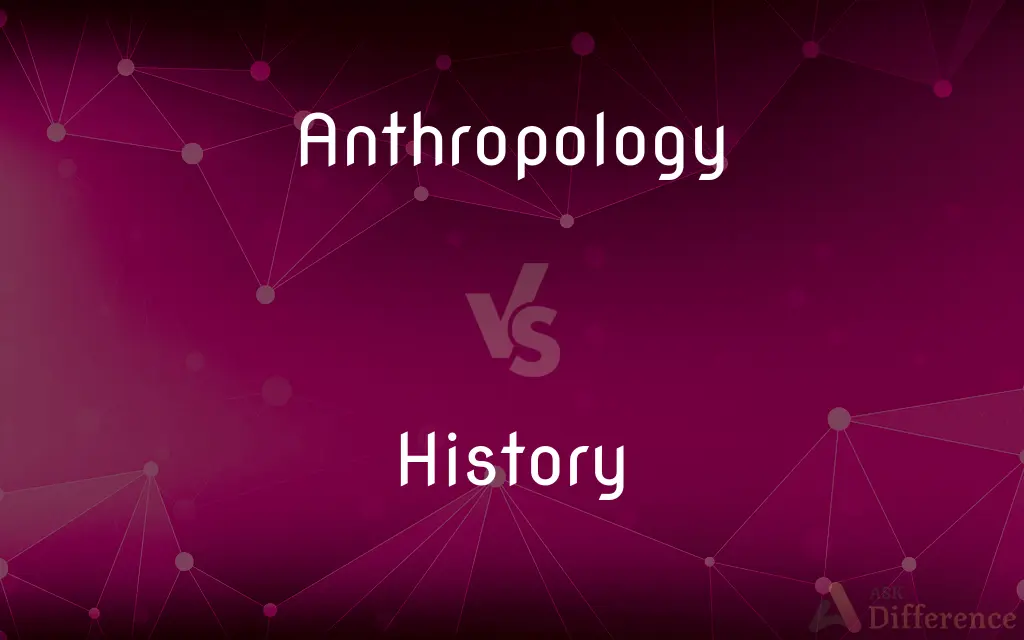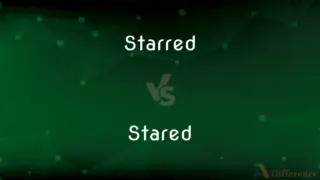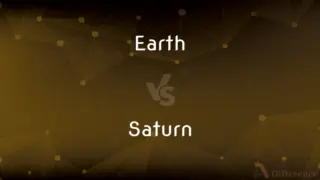Anthropology vs. History — What's the Difference?
Edited by Tayyaba Rehman — By Fiza Rafique — Updated on September 26, 2023
"Anthropology" is the study of human societies, cultures, and behavior, often involving fieldwork and analysis. "History" is the study of past events, societies, and individuals based on written records and evidence.

Difference Between Anthropology and History
Table of Contents
ADVERTISEMENT
Key Differences
Anthropology studies human societies, cultures, and behavior. History studies past events, societies, and individuals.
Anthropology: It often involves fieldwork and observation of living cultures. History: It relies on written records, documents, and archaeological findings.
Comparison Chart
Focus
Studies human societies, cultures, and behavior
Studies past events, societies, and individuals
Methodology
Involves fieldwork, participant observation
Relies on written records, documents, archaeology
Temporal Scope
Examines both contemporary and ancient cultures
Focuses on documenting and understanding the past
ADVERTISEMENT
Research Goals
Understands human diversity, cultural evolution
Analyze and interpret historical narratives
Example Sentence 1
"Anthropologists conducted ethnographic research."
"Historians analyze ancient manuscripts for insights."
Example Sentence 2
"Anthropology seeks to comprehend cultural practices."
"History provides insights into past civilizations."
Compare with Definitions
Anthropology
"Anthropology helps us appreciate cultural differences."
History
"History" focuses on the study of past events.
Anthropology
"Anthropologists study tribal customs and rituals."
History
"Historians analyze ancient texts for insights."
Anthropology
Anthropologists explore both contemporary and ancient societies.
History
Historians aim to understand the evolution of societies.
Anthropology
It involves fieldwork to understand diverse cultures.
History
History (from Greek ἱστορία, historia, meaning "inquiry; knowledge acquired by investigation") is the study of the past. Events before the invention of writing systems are considered prehistory.
Anthropology
"Anthropology" studies human societies and cultures.
History
A chronological record of events, as of the life or development of a people or institution, often including an explanation of or commentary on those events
A history of the Vikings.
Anthropology
Anthropology is the scientific study of humanity, concerned with human behavior, human biology, cultures and societies, in both the present and past, including past human species. Social anthropology studies patterns of behaviour, while cultural anthropology studies cultural meaning, including norms and values.
History
A formal written account of related natural phenomena
A history of volcanoes.
Anthropology
The study of human societies and cultures and their development.
History
A record of a patient's general medical background
Took the patient's history.
Anthropology
The scientific study of the origin, the behavior, and the physical, social, and cultural development of humans.
History
An established condition or pattern of behavior
An inmate with a history of mental illness and drug abuse.
Anthropology
That part of Christian theology concerning the genesis, nature, and future of humans, especially as contrasted with the nature of God
"changing the church's anthropology to include more positive images of women" (Priscilla Hart).
History
The branch of knowledge that records and analyzes past events
"History has a long-range perspective" (Elizabeth Gurley Flynn).
Anthropology
The holistic scientific and social study of humanity, mainly using ethnography as its method.
According to anthropology, there are six basic patterns of kinship terminology (i.e., "kin naming systems"): Sudanese, Hawaiian, Eskimo, Crow, Omaha, and Iroquois.
History
The past events relating to a particular thing
The history of their rivalry is full of intrigue.
Anthropology
The science of the structure and functions of the human body.
History
The aggregate of past events or human affairs
Basic tools used throughout history.
Anthropology
The science of man, including the study of the ditribution of physical and cultural attributes in relation to man's origin, location, history, and environment; - sometimes used in a limited sense to mean the study of man as an object of natural history, or as an animal.
History
An interesting past
A house with history.
Anthropology
That manner of expression by which the inspired writers attribute human parts and passions to God. See also anthropopathite, anthropopathism, anthropomorphist.
History
Something that belongs to the past
Their troubles are history now.
Anthropology
The social science that studies the origins and social relationships of human beings
History
(Slang) One that is no longer worth consideration
Why should we worry about him? He's history!.
History
A drama based on historical events
The histories of Shakespeare.
History
The aggregate of past events.
History repeats itself if we don’t learn from its mistakes.
History
The branch of knowledge that studies the past; the assessment of notable events.
He teaches history at the university.
History will not look kindly on these tyrants.
He dreams of an invention that will make history.
History
The portion of the past that is known and recorded by this field of study, as opposed to all earlier and unknown times that preceded it (prehistory).
In all of human history and prehistory
In all recorded history
History
(countable) A set of events involving an entity.
What is your medical history?
The family's history includes events best forgotten.
A long and sordid history
History
(countable) A record or narrative description of past events.
I really enjoyed Shakespeare's tragedies more than his histories.
A short history of post-Columbian colonization
History
A list of past and continuing medical conditions of an individual or family.
A personal medical history is required for the insurance policy.
He has a history of cancer in his family.
This diagnosis is usually based solely on the history and physical examination, although laboratory tests are occasionally also obtained.
History
A record of previous user events, especially of visited web pages in a browser.
I visited a great site yesterday but forgot the URL. Luckily, I didn't clear my history.
History
(informal) Something that no longer exists or is no longer relevant.
I told him that if he doesn't get his act together, he's history.
History
(uncountable) Shared experience or interaction.
There is too much history between them for them to split up now.
He has had a lot of history with the police.
History
(obsolete) To narrate or record.
History
A learning or knowing by inquiry; the knowledge of facts and events, so obtained; hence, a formal statement of such information; a narrative; a description; a written record; as, the history of a patient's case; the history of a legislative bill.
History
A systematic, written account of events, particularly of those affecting a nation, institution, science, or art, and usually connected with a philosophical explanation of their causes; a true story, as distinguished from a romance; - distinguished also from annals, which relate simply the facts and events of each year, in strict chronological order; from biography, which is the record of an individual's life; and from memoir, which is history composed from personal experience, observation, and memory.
Histories are as perfect as the historian is wise, and is gifted with an eye and a soul.
For aught that I could ever read,Could ever hear by tale or history.
What histories of toil could I declare!
Justly Cæsar scorns the poet's lays;It is to history he trusts for praise.
No more yet of this;For 't is a chronicle of day by day,Not a relation for a breakfast.
Many glorious examples in the annals of our religion.
History
To narrate or record.
History
The aggregate of past events;
A critical time in the school's history
History
The continuum of events occurring in succession leading from the past to the present and even into the future;
All of human history
History
A record or narrative description of past events;
A history of France
He gave an inaccurate account of the plot to kill the president
The story of exposure to lead
History
The discipline that records and interprets past events involving human beings;
He teaches Medieval history
History takes the long view
History
All that is remembered of the past as preserved in writing; a body of knowledge;
The dawn of recorded history
From the beginning of history
History
It relies on written records and archaeological findings.
History
"History provides a window into bygone eras."
Common Curiosities
How do anthropologists conduct research?
They often use fieldwork and participant observation.
Why is anthropology important?
It helps us appreciate and respect cultural differences.
What is the goal of anthropology?
To understand the diversity and evolution of human societies.
Does anthropology focus on the past?
It examines both contemporary and ancient cultures.
Does history explore contemporary events?
No, it primarily focuses on documenting the past.
What is anthropology?
Anthropology is the study of human societies, cultures, and behavior.
How do historians conduct research?
They rely on written records, documents, and archaeological evidence.
What is history?
History is the study of past events, societies, and individuals.
Why is history important?
It provides insights into the evolution of civilizations and human societies.
What do historians aim to achieve?
They analyze and interpret historical narratives.
Share Your Discovery

Previous Comparison
Starred vs. Stared
Next Comparison
Earth vs. SaturnAuthor Spotlight
Written by
Fiza RafiqueFiza Rafique is a skilled content writer at AskDifference.com, where she meticulously refines and enhances written pieces. Drawing from her vast editorial expertise, Fiza ensures clarity, accuracy, and precision in every article. Passionate about language, she continually seeks to elevate the quality of content for readers worldwide.
Edited by
Tayyaba RehmanTayyaba Rehman is a distinguished writer, currently serving as a primary contributor to askdifference.com. As a researcher in semantics and etymology, Tayyaba's passion for the complexity of languages and their distinctions has found a perfect home on the platform. Tayyaba delves into the intricacies of language, distinguishing between commonly confused words and phrases, thereby providing clarity for readers worldwide.














































